The timing of environmental policy in a duopolistic market
DOI:
https://doi.org/10.7201/earn.2015.01.02.Keywords:
Commitment, duopoly, innovation, standards, taxes.Abstract
In this paper the strategic use of innovation by two polluting firms to influence environmental policy is evaluated. The analysis is carried out by comparing two alternative policy regimes for two policy instruments: Taxes and standards. The first of the regimes assumes that the regulator commits to an ex-ante level of the policy instrument. In the second one, there is no commitment. The results show that when there is no commitment and a tax is used to control emissions, the strategic behavior of firms can be welfare improving if the efficiency of the clean technology is relatively low. If this is not the case, the strategic behavior of the duopolists has a detrimental effect on welfare regardless of the policy instrument used to control emissions.
Downloads
Published
Issue
Section
License
Assignment of publishing rights for accepted manuscripts: Authors will assign to the Spanish Association of Agricultural Economics (Asociación Española de Economía Agraria, AEEA) the copyright of the manuscript and any supplemental tables, illustrations or other information submitted therewith that are intended for publication as part of or as a supplement to the manuscript in all forms and media (whether now known or hereafter developed), throughout the world, in all languages, for the full term of copyright, effective when and if the article is accepted for publication. No revisions, additional terms or addenda to this Agreement can be accepted without our express written consent.

